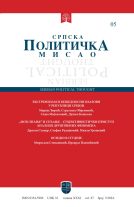- Home page
- Researchers
- Zoran Stojiljković
Zoran Stojiljković
Faculty of Political Science, University of Belgrade

Strike And Power(Lessness) Of The Union
The aim of this paper is to identify, on the basis of an analysis of the causes, the course and effects of strikes in Serbia over the last three decades, the mechanisms by which society and trade unions have moved from self-management mythology to the defense of whatever wages and “decent, dignified work” as the maximum goal. The drama of the decay of labor and trade unions, as well as the crisis of society, is presented in three chronologically related acts. The first one describes the process of decay concealed behind the call for patriotism, a kind of socialist-patriotic deception. The second one is the democratic introduction of capitalism through “predatory privatization”. The current, third act, illustrates how neoliberal populism seeks to pacify any resistance of employees and autonomous unions by creating their surrogates through political clientelism and party employment.

Serbia Between Electoral Authoritarianism and Consolidated Democracy
Transition from mono-organisational, single-party, ideological and authoritarian regimes into plural, competitive and democratic systems has proven a far more complex and uncertain process, with a far higher social price than the analysts, and especially citizens of the transition countries expected and desired. In this text, starting from different qualitative and quantitative criteria and indicators for “democracy measuring”, the author formulates and argues an assessment that after two decades of transitional roaming, Serbia is just a “deficient”, semi-consolidated democracy, and he suggests the elements of “exit strategy” from the status of democratic deficit.

Serbia in the Party Labyrinth
In this paper, the author attempts to determine the nature of the relationship between voters’ social position and value set on the one hand, and the programmatic and pragmatic-political, market position of political parties on the other. The process of stabilizing and strengthening of their mutual relations and the consequent consolidation of the party scene would lead to a way out of the party labyrinth for citizens and political processes.
